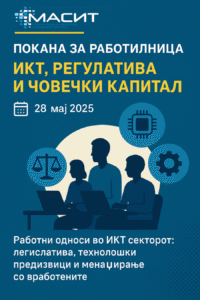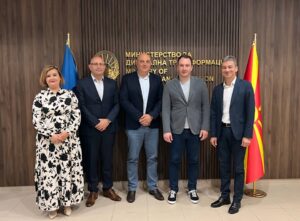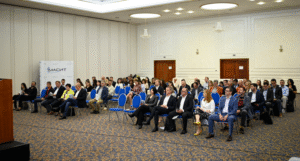Interview with Anita Nikova, MASIT: ICT sector has great export potential, measures are needed to be more competitive
Interview for export.mk
Anita Nikova is the Executive Director of MASIT, the Chamber of Commerce that represents the interests of companies working in the field of information and communication technologies and who has been working for years on the ICT industry to get the right place in the economy and the state it deserves.
The ICT sector in 2018 generated revenues of over EUR 862 million, and the export of this industry in the past five years has grown from EUR 60 million to over EUR 160 million.
Nikova says that the ICT sector has great potential to increase exports with more value added from the country. In an interview with Export.MK Nikova announces and explains the measures that MASIT will ask the state for the ICT sector to become even more competitive. MASIT’s demands include a reduction in fiscal charges for employees, support for investment in education and training of staff, as well as a range of different tax measures and incentives to improve the working conditions of employees in the sector.
You have been at MASIT for a long time as CEO, which is practically the voice of the Macedonian ICT industry. How satisfied are you with the Chamber of the achievements so far in the direction of the ICT industry getting the right place and treatment?
MASIT has been representing and advocating the interests of the ICT industry in the country for 20 years, striving to get the ICT industry the right place and treatment, which I believe we are still far from, although a significant portion of our suggestions and remarks have been accepted in recent years. and realized.MASIT’s endeavors are not only to stimulate the ICT sector, but to raise the awareness of the whole society that without the ICT industry, the growth of the overall economy in all branches of the economy and its competitiveness is impossible.
It is necessary to change the perception of the ICT industry, that it is not only a service activity of other branches, but that it is the backbone of prosperity and development. We believe in the potential of the ICT industry that can improve the overall economy and quality of life of all citizens in our country.
The ICT industry has seen continuous growth and development in the last few years. Can you bring the public the importance and importance of the ICT industry to the Macedonian economy a little more visually?
The ICT industry is a rare example of a part of the Macedonian economy that has the potential to generate strong economic growth and benefits that are felt not only in the economy but also in society at large. It is an industry where there is direct investment without the exploitation of natural resources, there is no pollution of the environment, and the state of raw material export can turn into an exporter of high value added products and services.
Expansion of this industry means increase of foreign exchange inflows, development of all other sectors, digitization of the economy and the state itself, ie the state apparatus.
Today, the technological development of a country is directly linked to the development and progress of the ICT sector as it carries the most modern concepts of management, production, marketing and so on.The ICT sector has unlimited potential and has seen steady employment growth, while employees are one of the highest paid professionals, working in the best possible conditions and contributing the most to taxes and contributions in the country.
According to the data at our disposal, the ICT sector has registered continuous growth with total revenues of EUR 862,342,656 in 2018, which is an increase of 10% compared to 2017. The number of employees in the sector increased by 14,541 at the end of 2018, ie 7% more than in 2017. Exports also recorded high growth rates with export revenues of EUR 160 million for 2018, up by 25% compared to 2017. We will soon have the figures for 2019 which we expect to show further accelerated growth of this sector.
An additional increase was also registered in the average net salary paid in the sector, which, according to the latest data published by the Statistical Office, amounted to Denar 60,899 in October 2019 (increase of 2.1% from the same period last year) and was 2.4 times higher than the average. salary in the state.
For the importance and importance of this sector for the Macedonian economy we point out to the indicator average income per employee which at the level of the whole economy amounts to 15,317 euros, while in the ICT sector the average income per employee is 59,304 euros. This means that one employee in the ICT sector contributes 3.9 times more than the average for the whole economy.
Export of information and computer services from the country has seen high growth rates in the past years. How do you assess the export potential of this sector and how can ICT exports increase?
The outsourcing industry is one of the fastest growing in Macedonia, with double-digit employment growth in each of the last five years, and is developing as one of the most promising industries in the national economy.
The number of employees working in 187 companies in this area is 5,713, which is 0.6% of the total number of employees in the economy. That’s up from 1,174 people over 2017, with the number expected to reach 15,000 by 2022.
The outsourcing industry’s revenues reached EUR 150.3 million in 2018, ie growing at an average rate of 17.9% per annum in the period 2015 – 2018. The industry is growing significantly faster than the domestic economy and by 2022 its revenues will reach 288 million euros.
What measures could be effective to increase the competitiveness of this sector and increase exports?
First, by reducing the fiscal burden on ICT employees, it is necessary to promote the competitiveness of Macedonian ICT companies on the international market.
Second, by supporting education, both formal and non-formal education, it is necessary to produce new quality staff and retraining existing employees who will be industry leaders in the future.
Third, different measures should create better working conditions for the ICT sector employees, which will motivate them to stay in the country
.However, in addition to these three sets of proposed measures, the state, through all its policies, needs to take into account the needs and specifics of the ICT industry and the various state policies and rules that may reflect the performance and competitiveness of firms, and adapt them to their needs. needs.
MASIT President Ms Aneta Peseva recently announced that MASIT is working on a tax reform proposal for the ICT sector only, which will be based on a comparative analysis of countries in the region where the ICT sector is highly developed thanks to various tax incentives by the state. Can you tell us more about the measures being proposed or at least point out some examples from other countries of how they support this sector and deliver results?
Part of the measures we are proposing to maintain and increase the competitiveness of domestic ICT firms competing in the highly competitive global market is to reduce the fees that Macedonian companies have to pay their employees.
There are two possible solutions here. The first is to reduce the personal income tax rate for the ICT sector to 0%. This solution is not unknown in the region. With the introduction of such a tax rate, Romania has been able to retain staff in the industry and even return a certain percentage of the labor force that had left the country so far. The second possible solution is to limit the amount of the base on which social security contributions are paid to ICT employees. This model is applied in Bulgaria, a country in the region where there is a strong growing ICT sector.
Also, in terms of investment in education that will be ready to meet the needs of this growing industry, both in terms of quantity and quality. The number of new employees that the industry needs, as well as the quality of their education that should be appropriate for the successful performance of their job duties, we propose two types of measures. The first would focus on retraining or upgrading existing employees in the sector, while the second set of measures would focus on educational institutions that train ICT industry personnel.
Regarding the first set of measures, the state should stimulate investment in the education of employees in the IT sector through tax exemption or reduce the tax levy on tuition-related expenses, participation in conferences, seminars, training of employees.
If we know that the state recognizes and exempts from taxation the cost of investing in new equipment, computers, for example, it would be logical to recognize as an expense the investment in education, to the knowledge of employees which is a key prerequisite and an essential tool for working in the IT sector. . This is not an unknown solution. Looking at the region, Croatia has established an excellent model of state aid for research and development projects and state aid for education and training of staff.
Regarding the second set of measures, it is necessary to introduce tax incentives for educational donations, such as sport donations, which will stimulate ICT companies’ investments in educational institutions. This would be of great benefit to educational institutions, and companies would closely follow the process of educating future staff in the industry.
Mobility of staff in the ICT sector is also a major problem for Macedonian IT companies. How can the fight to retain qualified personnel be successful?
Improving the working conditions and better quality of life of the ICT industry employees should work to retain existing employees and motivate new staff to be employed in domestic companies.
It is undisputed that the migration of highly skilled ICT labor force to other countries is not solely due to economic interest, ie. higher wages, but also a good part of the reasons for migration, should also be sought in the better living conditions (health, education, infrastructure, etc.) that employees and their families are offered by Western European countries.
Therefore, through a set of measures, in order to motivate employees to stay at home firms, it is necessary to provide for tax deductions for costs incurred in improving working conditions (sports and recreation, team-building, vacation, child care and etc.) that companies in the ICT industry would receive for such investments that would mean a better quality of life for employees and their families.
Also, given the quality of public health services, tax incentives for private health insurance costs are needed by the majority of ICT industry employees.Constantly improving the education system and the environment are also factors that motivate young highly qualified staff to move out.
How do you assess the willingness of companies and institutions to cope with the challenges of the new era of increasing digitalisation? How far is Macedonia from a digitalized state?
To some extent, the development of digital society in Macedonia is on track. Namely, we have a number of ICT solutions implemented by state agencies that function great, but we also have those that are implemented, upgraded and cast, and which do not work again.
A strategic approach to the digitization of the public sector is needed, which will be interoperable and fully compatible. This in turn means that all state institutions will communicate with each other easily, and for citizens it will mean a facilitated life in many respects.
In parallel, consideration should be given to supporting the digitization and SME sector of other industries, with a view to maintaining and enhancing their competitive advantage both at home and in the markets in which they appear and export.
And of course, the constant care of employees and the general awareness that they are the most valuable thing in any company.

News

Greater global breakthrough of the Macedonian ICT sector
MASIT at a meeting with the Ministry of Foreign Affairs The Chamber of Commerce for Information and Communication Technologies – MASIT is embarking on a new chapter and partnership with the Ministry of Foreign Affairs of the Republic of North Macedonia. This partnership aims to provide more intensive and constructive support to the Macedonian ICT sector. The collaboration is focused on enhancing the international visibility of the domestic ICT sector, creating conditions for entering new export markets, and better positioning Macedonian companies in the global economy. Through joint activities, participation in major international fairs, conferences, and business forums, as well as by establishing new channels to connect with the Macedonian diaspora and foreign investors, the initiative is expected to create tangible opportunities for growth and development for MASIT member companies. Within the framework of this collaboration, plans include organizing business delegations and direct meetings with potential partners abroad, preparing modern promotional materials, as well as initiatives to establish representative offices of Macedonian ICT companies in strategic markets. Additionally, initiatives for knowledge and technology transfer will be developed to contribute to enhancing the capacities of domestic companies. MASIT President, Mr. Jordan Dimitrovski, emphasized that the Chamber is strategically focused on providing long-term support and achieving an international breakthrough for companies in this industry, with a clear goal of creating conditions for sustainable growth and entry into new markets through partnerships and strategic initiatives. Minister of Foreign Affairs, Mr. Timcho Mucunski, highlighted that the Ministry is fully available to support the implementation of all future activities and initiatives that will enhance the competitiveness of Macedonian ICT companies and enable their more effective positioning in the global market. Through this partnership, MASIT strengthens its role as an active partner and supporter of its member companies in their internationalization process, contributing to a stronger positioning of the Republic of North Macedonia on the global ICT map.
15. 09. 2025y.

“ICT, Regulation and Human Capital”
Employment Relations in the ICT Sector: Legislation, Technological Challenges, and Workforce Management MASIT Organizes a Specialized Workshop on Employment Relations in the ICT Sector: Legislation, Technological Challenges, and Workforce Management MASIT is organizing a specialized workshop dedicated to the current challenges related to the application of the Employment Relations Act (ERA) in the ICT industry. The event will take place at the premises of our patron partner, Halkbank – Directorate 2, where a productive discussion will be opened with relevant representatives from institutions, university professors, and the business community. Key objectives of the workshop include: Analyzing the practical application of the ERA in the context of the ICT industry; Opening a dialogue on challenges related to workforce turnover as a result of automation and artificial intelligence; Sharing best practices for digitalized HR processes; Initiating a discussion on the need for a sectoral approach in regulating employment relations in ICT. The program includes: Panel discussions with representatives from the Government, legal experts, university professors, HR professionals, and ICT companies; Discussions on the most relevant provisions of the ERA affecting the ICT sector; Topics on employment contracts, remote work, bonuses, and leave policies; Legal aspects related to “technological redundancies” and the use of AI in companies; Practical examples of digitalized HR practices; Joint proposals for initiatives and potential legislative amendments in the context of the ICT industry. We anticipate significant participation from MASIT members, fostering a constructive exchange of experiences and proposals for improving regulations in line with the realities of the ICT labor market. Agenda 📍 Location: Halkbank🗓️ Date and Time: 28.05.2025, 09:00 – 13:00 The event is supported by HALKBANK AD as MASIT’s Patron Partner and is free of charge for the Chamber’s members. Новости Сите новости
22. 07. 2025y.

Meeting with the Minister of Digital Transformation
Common Priorities Set The Board of Directors of MASIT held a productive meeting with the Minister of Digital Transformation, Mr. Stefan Andonovski. The meeting was an excellent opportunity to deepen the collaboration between the Ministry and the Chamber, as well as to align priorities and visions for the further development of the ICT sector in the country. Minister Andonovski extended his sincere congratulations to the newly elected members of the MASIT Board of Directors and the President, emphasizing the importance of continuity and the Chamber’s ongoing work as a relevant and active partner to institutions. “MASIT is a great friend of the Ministry of Digital Transformation, and we will continue that way in the future,” stated the Minister, adding that joint activities will continue with increased intensity in areas such as digitalization, the economic potential of technology, modernization of public and private processes, development and application of artificial intelligence, and strengthening cybersecurity capacities. MASIT highlighted the key priorities of the new leadership – creating conditions for sustainable growth of the ICT industry, improving the business climate, boosting exports and internationalization of domestic ICT companies, and systemic support for digital skills and human capital. Both sides emphasized the importance of close and transparent communication, timely exchange of information, and the initiation of concrete measures and policies that will deliver real results for businesses, institutions, and citizens. The meeting served as confirmation of a joint commitment to building a digitally mature, resilient, and competitive society – a goal that requires collaboration, partnership, and a shared vision. News All news
25. 07. 2025y.

MASIT Held Its 19th Regular Annual Electoral Assembly
A new executive board has been appointed for the 2025–2028 term The Chamber of Commerce for Information and Communication Technologies – MASIT, Skopje, held its 19th regular Annual General Assembly on May 8, 2025, at the Alexander Palace Hotel, during which the new leadership of the Chamber was elected for the 2025–2028 mandate. At the regular General Assembly, Ilija Gospodinov from Endava was elected as the new President of the MASIT Assembly. Additionally, new members of the Management Board, Supervisory Board, and Court of Honor of the Chamber were elected. Members of the MASIT Management Board: Jordan Dimitrovski, Aitonix – President of MASIT Blagoj Hristov, Makedonski Telekom Dragan Chepujnoski, A1 Macedonia Damjan Manchevski, MAK-System Sofche Jovanovska, Scale Focus Vesna Ivanoska, Avenga Academy Kostandina Pareska Medarski, Valtech Filip Petrovski, Data Masters Zoran Lazarevski, Ultra Members of the MASIT Supervisory Board: Goran Mitev, Edusoft Mile Stoilovski, Bransys Marijana Andrić, Marand Members of the MASIT Court of Honor: Dashmir Istrefi, Hoyo Tech Sasho Jovanovski, Datalab Jana Damevska, Infigo На конститутивната седница на Управниот одбор на МАСИТ, која се одржа на 15ти мај 2025 година, г. Јордан Димитровски, експерт за развој на бизнис, сопственик и генерален директор на компанијата „Аитоникс“ беше избран за Претседател на Управниот одбор на МАСИТ за мандатниот период 2025–2028. Компанијата Аитоникс е високо етаблирана и добро позната во ИКТ индустријата, а оваа година одбележува 25 години успешно работење во Македонија. Веруваме дека изборот на г. Димитровски носи нова енергија, фокус на конкретни резултати и посветеност на јакнењето на улогата на ИКТ секторот во националниот развој.At the inaugural session of the MASIT Management Board, held on May 15, 2025, Mr. Jordan Dimitrovski, business development expert and owner and CEO of Aitonix, was elected President of the MASIT Management Board for the 2025–2028 mandate. Aitonix is a highly established and well-known company in the ICT industry, celebrating 25 years of successful operation in North Macedonia this year. We believe that the election of Mr. Dimitrovski brings new energy, a focus on concrete results, and a strong commitment to strengthening the role of the ICT sector in national development. In accordance with the latest amendments to the MASIT Statute, the role of President of the Management Board also serves as the President of the Chamber, including the responsibilities of the official representative of the Chamber before institutions, partners, and the public. This positions the role as key to the future leadership and representation of MASIT. We look forward to a period marked by enhanced collaboration among members, a proactive role of the Chamber in policy-making, and concrete steps toward the digital transformation and internationalization of Macedonian ICT companies. We congratulate the new President, Mr. Dimitrovski, and wish him a successful, dynamic, and inspiring mandate! Новости Сите новости
21. 07. 2025y.

MASIT held a professional workshop on the topic “ICT, Regulation, and Human Capital”
Organized by the Chamber of Commerce for Information and Communication Technologies – MASIT, on May 28 a specialized working meeting was held on the topic “ICT, Regulation, and Human Capital,” focusing on key challenges faced by the ICT sector in terms of regulation, human capital, and technological changes. The event brought together relevant representatives from institutions, the business sector, and academia. The first panel discussion featured Mr. Gjoko Velkovski, Deputy Minister for Social Policy, Demography and Youth, Mr. Lazar Jovevski, university professor and advisor to the Prime Minister on labor and social policy, Mr. Mladen Frchkoski, Head of the Labor Market Department at the Ministry of Economy and Labor, and Mr. Jordan Dimitrovski, President of MASIT, who in his address emphasized that the Chamber remains a strong advocate for the interests of the ICT industry and will intensify efforts to create a fair, predictable, and modern regulatory framework that supports digital transformation and the development of human capital as a key ICT sector resource. The legal aspect of the current regulations and the challenges faced by ICT companies were thoroughly addressed by Mr. Jovan Najdenovski — lawyer and long-time legal representative of MASIT. We are especially pleased that attendees had the opportunity to hear first-hand about the complexity of the everyday legal challenges ICT companies face. Professional insights and practical experiences were also shared by Ms. Nevena Meshko from Mak System, Ms. Ana Zakovska from ITLabs, and Ms. Dina Ivanovic from Prohiad SEE, each with significant roles in human resources, labor relations, and legal regulation within their companies. The discussion was enriched with valuable perspectives from other sectors as well, thanks to Ms. Kristina Spiroska from Halkbank, Mr. Slavko Sazdovski from Triglav Life Insurance, and Mr. Dejan Pavleski from Semos, who shared their practical experiences from the banking and insurance industries. Among the key topics discussed were the application of the Labor Law in the context of flexible work models, the legal and practical implications of automation and artificial intelligence, digitization of HR processes, and the need for new internal regulations related to working from home or abroad — i.e., remote work. The closing segment highlighted specific conclusions and recommendations for further action. One of the key outcomes of the event was the initiative to form a MASIT working group to propose amendments to the Labor Law in line with the ICT industry’s specific needs. It was also proposed to organize thematic roundtables including all relevant stakeholders — institutions, companies, and experts — to align regulation with current conditions and needs. The event was held at Halkbank‘s premises, a patron partner of MASIT, whose support and hospitality were essential for the successful organization of the meeting. MASIT remains committed to improving the business environment for ICT companies and advocating for industry interests during the creation and adaptation of the legal framework. Through collaboration, expertise, and an integrated approach, MASIT will continue leading the dialogue for a better future for the ICT sector in Macedonia. Новости Сите новости
23. 07. 2025y.

POSTPONED: Celebration of MASIT’s 25-Year Anniversary Jubilee
Новости Сите новости
20. 07. 2025y.